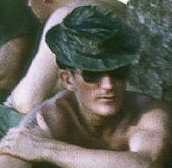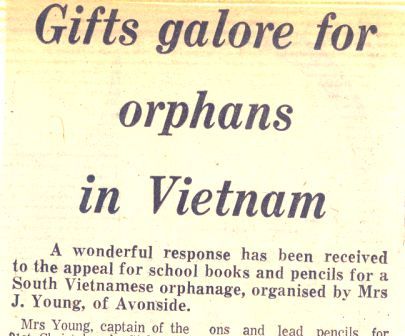|
In Trouble - Jim Mitchell
Everything
was quiet the dappled sun played on the water and the only
sounds were the river and the birds in the branches above us.
One of us should have sat sentry, I know, but we didn't bother
and we were soon lathering ourselves in the cool water. I
had just pulled my trousers up when I looked upstream.
There was movement in the bush near the track. I put my
glasses on and saw to my horror that three men had stepped out
from the bush and were crossing the river. Morrison heard
me grunt and looked up to see me pointing at the trio and trying
to speak. They were without a doubt Charlie. They had on
black pyjamas, Chicom webbing the whole thing. Fortunately
they were even less ready than we were and they had their
AK47s
slung across their backs. They had seen me and the two
others and were trying desperately to get their weapons into a
firing position. I picked up my
M16
and aiming it roughly at the still struggling VC pulled the
trigger and nothing happened. Greenaway and Morrison were
blasting away as I berated myself for forgetting to undo the
safety catch. I flicked that off put the butt into my
shoulder and pulled the trigger. I had pushed the fire
selection lever to full auto and got rid of 30 rounds in a
second or so. About this time the M60 started first blowing
apart the bush on the edge of the river then throwing up great
gouts of mud and water around the VC who were, amongst other
things, trying to get their weapons into position. Then
our magazines empty we ran and dived behind the large rock. The
booming of the M60 continued and then tapered off. Postscript there is an an abbreviated version of this event written by the Platoon Commander involved. In it the three of us who went down to the river are taken to task for being where we shouldn't have been. Well Boss, xin loi but we were ordered down to fill water bottles. Sorry we messed things up.
|
Small Beginnings
and Baria Orphanage – Bruce Young This story is offered as balance to the perception that back
home in 1970 the country was overcome by
The story starts in a small way with a letter I wrote home to my youngest sister Julie, then 14 years of age. I had been invited by Jack Morris [Coy HQ driver] to ride shotgun for a visit to the Baria orphanage and attached school and had observed the less than ideal conditions the orphans, mostly of mixed race [American father – Vietnamese mother], were living under while being cared for by a Roman Catholic order in the midst of a Buddhist community. For something to say in the letter I suggested she and her friends might like to ‘do something’ for the orphans. Julie in turn asked my mother, who as an officer of the 21st Christchurch Girl’s Brigade Company decided to ask the 46 girls in the Company if they would be willing to help the orphanage. These girls in turn asked their parents who joined in.
Cpl Bruce Young and orphan, Baria Orphanage 1970 [Young]
I had been a member of the St Chad’s cub pack so my mother also approached their leader who thought it a great chance for his Cub’s to help others and bought it up at a Mother and Son evening. The Cub mothers agreed to help and enlisted the help of the local Ranger’s. With more than 200 people now directly involved my small throw-away suggestion to my sister had grown into a community-based initiative to do something for the orphans, and by association, something to acknowledge the efforts of the New Zealand soldiers. The group of motivated children and their mothers started to collect things, make things, and buy things, with the group making a decision not to send worn-out cast-offs. Finally four 2’x18” boxes were crammed with new dresses and boys clothes, underwear, towels, soap and all other toilet materials, bandages and plaster, sewing gear, toys of all kinds, sweets, colouring books, scrapbooks, pencils and so on. A comment was made that the people involved based their help on physical necessities but remembered that everything was intended for little children.
The group realised they had no idea how to actually ship the boxes so the Cub leader approached the Army at HQ Southern Military District and the Army arranged for the supplies to be flown to Vietnam on a scheduled RNZAF flight. I was in the bush with 2Pl when Jack Morris advised me that a number of parcels with ‘Baria Orphanage’ written on them but addressed to me were in the W3 CQMS store. He happily joined the effort and when I was next out of the bush took me and Baden Ewart [NZ Component] to Baria to deliver the boxes.
Afterwards I wrote a very fulsome letter back to my family: “I’ve had a wonderful thrill this morning, when I took the parcel’s I’d received down to the orphanage. I spent an hour there and was shown around again, this time visiting each classroom…. Since the last trip the number of orphans had changed little with 40 girls and 37 boys in residence. Their pet monkey had unfortunately died just after my last visit… Three nuns helped me unpack the big box and the other pillow cases. One nun and four helpers started ironing most clothes and used some of the buttons to repair some of the children’s [existing] clothing….” Then came the bit which kept the project going: “The chalk in the parcel was one of the most appreciated items they received. The reason [I didn’t realise either just how desperate] is that the orphans in school are short of school books, coloured pencils, lead pencils and chalk. The kids are writing arithmetic in the front of a book, geography in the middle and in some cases biology or science in the back. There are 30 classrooms suffering from a shortage of the above mentioned articles.”
Mother swung into action again, this time by writing to the
local paper and quoting from my letter. The ‘Christchurch Star’ ran the article with a request for people to help the
Baria Orphanage and offering Mum’s address for donations of lead pencils, books and other school stationery. Mum records
that the response was ‘magnificent’. The Star later reported that
“Young school children, parents, older people from all over Christchurch and the
outlying areas contributed a grand total of 2113 exercise books, pads, notebooks, jotter pads, rubbers, crayons, paints,
chalk, pencils, ballpoints, pencil sharpeners, sheets of loose paper, and paint brushes.” Again the Army was asked to
help with movement, and again the RNZAF delivered to Vietnam, this time to NZ Component as W3 Coy had departed theatre.
Baden Ewart and other NZ Component
staff then delivered the parcels, receiving a similar welcome and
response from the nuns as
Cpl Baden Ewart with orphans and nun, Baria Orphanage 1970 [Young]
Baria Orphanage was, I discovered later, well patronised and
supported by 1ATF units, primarily because it was in a safe urban environment on the way to Vung Tau, and was a regular stop
for the 1ATF Catholic padres. The general support shown from the ANZAC soldiers kind of rebuts the urban propaganda
distributed by the New Zealand anti-war movement that the soldiers were baby-killers and dehumanised by their operational
tours. It also goes some way to rebut the theory that there was little support for the war effort among the general
population. Small though it was in the scale of things, I believe my mother and the others involved did more for the
well-being of the Vietnamese people than any amount of protest by stay-at-home
[I have nothing but distain for the anti-war protesters] |
 The dry
season still had a few months to go before the first monsoonal
rains of the wet season. We were still enjoying our time
in country. The feeling of being at the centre of pivotal
world events was exciting and we were still healthy from our
year in Malaysia. We had seen no real action and were
consequently a little cocksure. Even the open forest we
had been moving through was pleasant though the ground was rock
hard and made digging in each night torture. The one
problem in the dry was water. There was none of it around.
Earlier in the year we had tried digging for it in the sandy
soil near the coast. We got down to about ten feet and
gave up. There wasn't a trace of dampness. So like
every one else we had water dropped out to us in the next
The dry
season still had a few months to go before the first monsoonal
rains of the wet season. We were still enjoying our time
in country. The feeling of being at the centre of pivotal
world events was exciting and we were still healthy from our
year in Malaysia. We had seen no real action and were
consequently a little cocksure. Even the open forest we
had been moving through was pleasant though the ground was rock
hard and made digging in each night torture. The one
problem in the dry was water. There was none of it around.
Earlier in the year we had tried digging for it in the sandy
soil near the coast. We got down to about ten feet and
gave up. There wasn't a trace of dampness. So like
every one else we had water dropped out to us in the next ![Cpl Bruce Young & orphan, Baria Orphanage 1970 [Young]](images/Baria_orphanage2.jpg)

![Cpl Baden Ewart with orphans & nun, Baria Orphanage 1970 or early 1971 [Young]](images/Baria_Orphanage1.jpg)